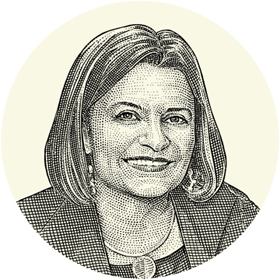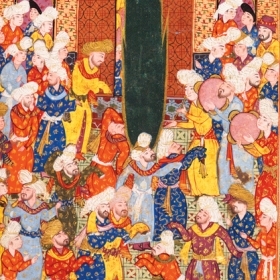Dan Chiasson, profiled in “A Way of Words” (summer ’14), is just the latest in a long line of acclaimed poets teaching at Wellesley. Readers remind us that the line also includes Philip Booth and Richard Wilbur.

The Poetic Line
Thank you so much for your recent and unexpected article on poetry (“A Way of Words,” summer ’14). I majored in English literature and loved the classes on poetry at Wellesley, got a Ph.D. at Yale, and have had a long teaching career at Occidental College in Los Angeles. I was greatly influenced by David Ferry and his intense focus on both scholarship and writing. He was a wonderful mentor, and I was lucky to have had chances to see him when I visited Boston. He is deservedly a highly honored poet, and I admire his work enormously. One is never quite certain the sources of one’s passions—Why a poet? But I do know that David’s work was a model for me, and I am grateful for a life of working, to quote your article, “to form a poetic line.” Again, thank you.
Martha Ronk ’62, Los Angeles
(Ronk has published 10 books of poetry; her most recent was on the longlist for the National Book Award.)
Don’t Forget Booth …
I came away from reading the great article about Dan Chiasson and the accompanying list of other Wellesley poet/faculty members wondering what happened to Philip Booth. He was a contemporary of David Ferry and both taught a class in modern American poetry my freshman year—1958–59. I took Booth’s class, and my roommate, Meg Meglathery Gertmenian, Ferry’s. Each of us knew that these classes taught us a great deal about how to read poetry. Booth obviously didn’t stay at Wellesley as long as Ferry, but I think he deserves a place on that list of poet/professors.
I left Wellesley after my sophomore year, but graduated from Smith as an Ada Comstock scholar in 1990.
Susan McKenzie Wolk ’62, Williamstown, Mass.
… or Wilbur
I was surprised that “The Poetic Line,” which appeared in the summer ’14 issue, omitted mention of Richard Wilbur. Granted his tenure was brief, but it was a pleasure and privilege to study with him in his course on the novel. I also enjoyed the challenge of studying under David Ferry, first in the required freshman English course (in which he graded my initial essay with a D+—richly deserved). Happily, things improved after that, and he was kind enough to oversee my senior honors project, a series of poems that were awarded the John Masefield Prize at graduation.
Anne Nieuwenhuis Thomas ’58, New Vernon, N.J.
Editor’s note: Our research on faculty poets had not uncovered Booth and Wilbur. Booth taught at Wellesley from 1954 to ’61 and Wilbur from 1955 to ’57.
Life Lessons
I never had Professor Menkiti as a professor at Wellesley (“Faculty Retirements,” summer ’14). I did know who he was, but it was not until several months after graduation that I had the privilege of becoming his student.
The day before my graduation from Wellesley, my family learned that my brother, Brian, had committed suicide. Brian was a 20-year-old junior at UCLA, a passionate filmmaker, and a gifted poet. I always loved reading Brian’s poems and had in fact shared many of them with my Wellesley friends. However, it was not until after his death that I knew I had to share my brother’s gift of the written word with the larger world. It was through my Wellesley network that I was introduced to Professor Menkiti—a poet himself and the proud owner of the nation’s oldest poetry bookstore, the Grolier.
My first year after college, I received the greatest education I could possibly have imagined, and it was from Professor Menkiti. From February to September 2007, Professor Menkiti and I met weekly at the Dunkin’ Donuts in Harvard Square to edit Brian’s poetry. I had never spent so much time in Dunkin’ Donuts before—and have to admit that I haven’t since. But between words on a page, a pencil, a doughnut, and my wise professor, I came to appreciate the power of language, its placement on a page, and its place in my life.
It’s been eight years since my graduation from Wellesley, eight years since losing my brother. However, when I think of one of the most memorable moments of my life, I recall walking in a cold New England winter to that Dunkin’ Donuts to find my dear Wellesley professor waiting to give me one of the most important lessons I’ve ever learned—how to love and how to let go.
Kelly Sheridan Feintech ’06, Miami, Fla.
Names and Identities
When I saw “What’s in a Surname?” in the summer ’14 issue, I flipped right to it. As a woman who kept her name and hyphenated both children’s surnames, I am interested in what others do, but admit to a satisfied smile when Teal Pennebaker ’04 revealed that she intended to keep her surname.
Like some women in the article, I faced an uphill battle to get people to respect my choice, and now, 11 years later, most do. How sad is it that in 2014, when many women marry after establishing themselves in careers with their birth names, it is still largely expected that they change their surnames?
Interestingly, much of the pressure to change comes from the woman herself and society as a whole. Several women I know changed their names because they didn’t want to insult their husbands’ names, even though the men had said they didn’t care. When my high-school students learn that I kept my name, they always ask, “Why would you do that?” I explain my reasons, but am shocked that the girls had never considered keeping their names.
When our daughter was born in 2008, my husband and I faced another battle for acceptance of her hyphenated surname. I give him credit for fighting it with me, because when we first discussed children’s surnames, he was not entirely on board with hyphenating. It amazes me that in this age of high-powered women leaders and well-educated women in every social class, many mothers, married or not, choose to give their children just the father’s surname if their own is different. Hyphenated surnames can be cumbersome, but for my husband and me, it’s a way for us both to maintain a nominal connection to our children, as well as our own identities.
Virginia Slaughter ’00, Smithfield, R.I.
A Woman by Any Other Name
The article “What’s in a Surname” struck me as a bit of a fluff piece. Maybe that’s because I happened to land on the traditional side of the generation gap. In any event, what a woman calls herself is not what defines her. As Shakespeare’s Romeo put it, “That which we call a rose, by any other name would smell as sweet.” But, then again, he was a man.
Still, women should not obsess over what last name to choose with the expectations that their decision will make a significant difference in who they are or what they hope to be.
Doris Schaffer O’Brien ’54, Pasadena, Calif.
No Right Answers
Thanks for Teal Pennebaker’s interesting piece on surnames. Graduating in 1961 and marrying shortly thereafter, I changed my name without thinking; no woman did otherwise. Thirteen years later, after (who could have predicted, then) a divorce, I thought I would keep the name to avoid making my daughter uncomfortable. She was six, and in first grade, when I thought about changing back, and when I asked her if she would mind, she looked at me in astonishment and said, “Mommy, you should have whatever name you want. Why would it bother ME?” So I changed it “back” and vowed not to change it again. I stayed with my “maiden” name, even years later as I remarried. My husband and I have been married 35 years and when our housekeeper lived with us as our daughter grew up, there were four people and four names on our apartment door. Now there are only two and two, and it bothers neither of us when people mix them up. It has been advantageous that my daughter and I have different names; she doesn’t have to carry the “baggage” of my reputation! There are no right answers here, only choices. Ultimately, they aren’t the consequential ones. But one measure of a man’s self-confidence is his comfort in his wife’s having “her own” name.
Rosalie J. Wolf ’61, New York
Back in the Nest
I had to smile reading the thoughtful essay by Karen Grigsby Bates ’73, “The Un-Empty Nest,” in the last issue (Endnote, summer ’14). I, too, have a Skidmore grad (’14) living at home. In fact, she and Bates’ son are friends. While my daughter has a great summer job that has given her the confidence to rent an apartment in Somerville for the fall, there is not, from what I can see, a definitive plan in place beyond that. But part of our role as parents, I think, is, yes, to pick up the occasional carton of milk, and also to let our kids go and let them be.
My daughter will no doubt consume her fair share of “sardines and unsweetened tea,” as Bates did in her early days in New York City, while she struggles to find her place in the world. But I have no doubt that in the end she will find her way. Having had the pleasure of once meeting Bates’ charming and charismatic son in the Skidmore ceramics studio, I can say the same about him!
Sharon Kanner Johnson ’84, Newton, Mass.
North 40 Memories
Addendum to the interesting article on “The North 40’s Future” (summer ’14). In the 1950s (and perhaps longer), students in Botany 101 had plots in the North 40. We planted in autumn and harvested in the spring. I remember especially wonderful hyacinths, products of this “hands on” experience.
Elsa Kahn Ramin ’56, Chestnut Hill, Mass.
The Squint Factor
I agree with the letter from Jill Coxhead McManus ’62. The magazine’s print is uncomfortably small. I do have vision problems, but this latest issue made me feel that they had become much worse!
Alexandra Boyd Earle ’57, Providence, R.I.
Clarification
Filmmaker Anisa Mehdi ’78 had three production assistants for the documentary that was featured in “On Hajj,” (spring ’14). Laila Alawa ’12 was one of them.



